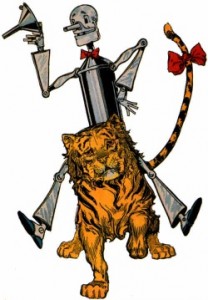No Hit Points? No Problem!
As anyone who's read the Oz books knows, it's easy to fall into a trap. It's really easy. How often did Dorothy and company get steered into the wrong place, or fall into someplace bad? Per book? Yeah.
Guess what? It can happen to game designers, too.
As I create this blog post, I'm putting the finishing touches on the new, updated version of Instant Oz. The version that's currently out now is great, but it still doesn't capture the essence of playing in an Oz book. It was just about there, but not quite. I couldn't put a finger on it.
By the way, I'm also drawing up a document for Instant Oz using the Fate Accelerated Edition rules, seeing as I want to add a Fate version as a stretch goal to our forthcoming Kickstarter campaign.
Now then, what is so brand-spanking new about Instant Oz? Well, Heroes are just a little bit different. For one, the Abilities are changed up and made a lot more intuitive. There are six of them and cover everything an Oz Hero needs to do (Lifting, Thinking, Moving). The other one is that I greatly simplified the conflict system.
See, this is where the trap is. With pretty much every game system out there having a way of tracking your downward spiral, I felt that I needed to have the same thing, in some way shape or form. Therefore, while there is no damage track or hit points, there is a three-strikes-you're-out mechanic and a requirement to track consequences.
However, every time I've ever played this version of the game with my group, I've never used either. Honestly, they just seemed to get in the way. So now, with this new version of the rules, all that is gone.
Simply put, matter what you do, you roll the dice, find the result, then narrate the result. In a conflict, both opponents roll, find the results, see who wins, winner narrates. If it makes sense to keep the conflict going, then it keeps going. If not, it doesn't.
I have found that this makes everything just go so much faster.
Seriously, how many times have you seen an extended conflict in the Oz books? Yeah, I didn't think so.
I also feel that doing it this way really puts the narrative into the players' hands even more, and I think people are smart and creative enough to determine when a conflict logically ends.
So yes, no hit points, no wit points, no hit locations, no damage tracks, no lists of consequences, just dice rolls and narration. Sweet, easy, and beautiful.



